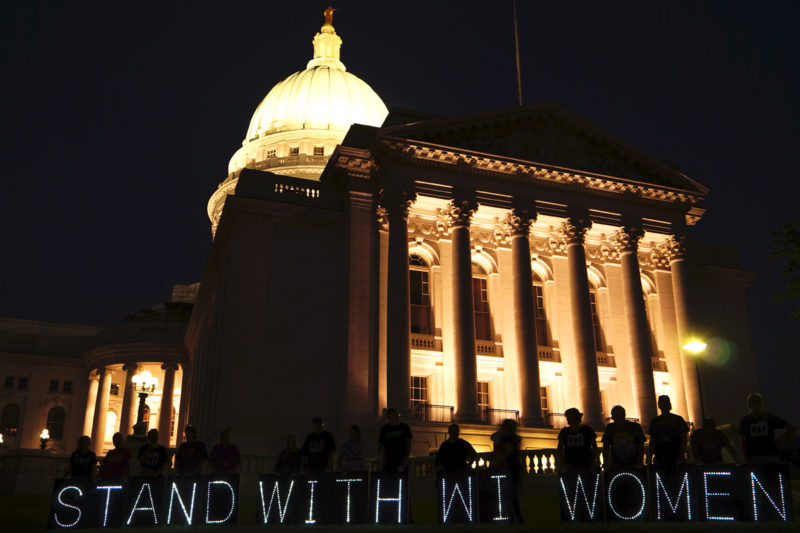Wisconsin Criminalized Abortion Before the Civil War. The Law Still Stands Today.
Wisconsin is among the states with a longstanding ban on abortion that would take effect if conservatives on the U.S. Supreme Court overturn Roe v. Wade.

One-hundred-and-seventy years after Wisconsin’s all-male legislature outlawed abortion, pro-choice activists and lawmakers are raising public awareness of the archaic ban.
The National Institute for Reproductive Health and the Wisconsin Alliance for Women’s Health launched a public awareness campaign this week that will include social media posts, billboards, and a website meant to better inform voters of dormant abortion bans in states like Wisconsin.
Abortion rights advocates believe the state’s abortion ban will play a role in Wisconsin’s 2020 legislative elections as the U.S. Supreme Court seems primed to gut the landmark decision in Roe v. Wade and the conservative-held Wisconsin Supreme Court seems unlikely to protect reproductive rights.
Anti-choice organizations and their allies in the state legislature “hope the public will fail to understand that there is a law criminalizing abortion on the books” in Wisconsin, Andrea Miller, president of the National Institute for Reproductive Health, said Wednesday during a press call hosted by pro-choice groups. “We know the precipice we’re on with Roe.”
Wisconsin is one of 11 states with pre-Roe bans on the books, according to the Center for Reproductive Rights (CRR). Those states include neighbors to Wisconsin like Michigan. Wisconsin’s state constitution provides no legal protections for abortion, unlike in Kansas, where the state supreme court ruled last week that abortion rights are “fundamental.” There are no statutory protections for abortion rights in Wisconsin, according to CRR.
Wisconsin’s GOP-dominated legislature hasn’t passed a so-called trigger ban on abortion—which would take effect if the U.S. Supreme Court overruled Roe—though Wisconsin Gov. Tony Evers (D) would likely veto such legislation if it were to pass both chambers.
State Rep. Chris Taylor (D-Madison) said Wednesday that most voters she speaks to are unaware of Wisconsin’s 170-year-old law criminalizing abortion. “We’re trying to get people to understand this still exists…and it puts women in Wisconsin at risk,” said Taylor, adding that state Democrats would try to repeal the law this year.
Scuttling the law criminalizing abortion would require approval from the Wisconsin legislature, where Republicans have a five-seat edge in the state senate and an overwhelming majority in the assembly. But even in states like New Mexico, where Democrats hold a state government trifecta, an attempt to repeal a pre-Roe abortion ban fell short as some Democratic lawmakers joined the GOP to uphold the longstanding ban. Democrats in other states, like Rhode Island, are making a push to enshrine abortion rights into law in case conservatives on the Supreme Court undermine Roe protections. But as happened in New Mexico, anti-choice Democrats are standing in the way.
Legislative attempts to repeal the 1800s abortion law have failed in Wisconsin over the past half century. The most recent repeal push was in 2008, Isthmus reported in 2018.
Miller, who called the push to repeal the 19th-century anti-choice law “a real winning issue” for pro-choice candidates in the 2020 election cycle, said she was encouraged to see many candidates who unapologetically defended abortion rights win their races in the 2018 midterms. “We know that [defending abortion rights] was a really potent and powerful motivator in the midterms,” Miller said during Wednesday’s press call.
Dr. Doug Laube, former American College of Obstetricians and Gynecologists president and an abortion care provider in Wisconsin, pointed out the absurdity of abiding by abortion-related legislation passed into law more than a century ago, long before “rudimentary” pregnancy tests became standard medical practice. “Medicine in the mid-1800s would not be recognizable to us today,” Laube said on the press call.
Laws criminalizing reproductive health care would undermine his “ethical, legal obligation to provide the highest standard of care” for people seeking abortions if Roe were overturned, he said. “Women should be able to make decisions without political interference,” he said.
Pre-Roe abortion bans not only threaten reproductive freedom, advocates said, but also the abortion care providers who would face criminal penalties should such a law take effect in the coming years. “Health-care providers should never have their hands tied by those who would use this issue to score cheap political points,” Miller said.

